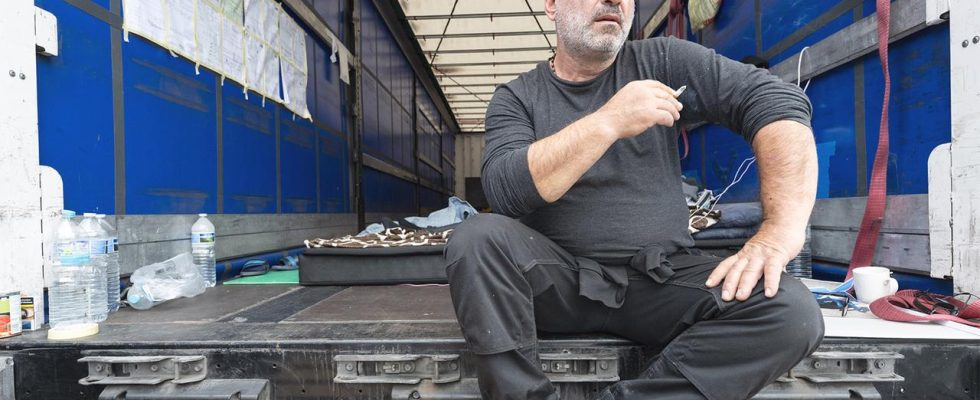Truck drivers from a Polish shipping company are on strike at the Gräfenhausen motorway service station in southern Hesse because of outstanding wages. The situation is getting worse – the men have gone on hunger strike.
There is a gas station, a branch of a burger chain, parking spaces – Gräfenhausen-West near Darmstadt on the A 5 is a normal motorway rest area. But what has been happening here for nine weeks has caused consternation.
Because their employer stopped paying wages in May, dozens of drivers parked their blue trucks and trailers at the service area in July – initially for an indefinite period of time. In the meantime there were up to 150 men who came from Uzbekistan, Georgia, Kazakhstan and Tajikistan. They wrote “No Money” on the tarpaulin of a trailer.
A truck driver in Gräfenhausen-West holds up a piece of paper on which he has written the amount his employer owes him.
It’s a lot of money: a total of more than 500,000 euros, which the strikers say they are entitled to. They are employed by the Polish shipping company Mazur – or one of its subsidiaries. And Mazur sometimes takes a rough approach: When around 60 truck drivers were waiting in Gräfenhausen in the spring, men in black appeared with an armored off-road vehicle to take their trucks away from the long-distance drivers. There was talk of a “paramilitary unit”.
Carrier reports driver
A large police presence was able to prevent anything worse from happening. But the horror was great. Politicians got involved, MEPs visited the rest stop, and at the end of April the shipping company paid – 300,000 euros, as it was said at the time. Probably also because customers put pressure on them and wanted their goods.
But that was obviously only a short-term solution. When the long-distance drivers agreed to strike for the second time in Gräfenhausen in mid-July, the Polish freight forwarder reported its employees to the Darmstadt public prosecutor’s office for blackmail. “A bottomless impudence,” says the German Trade Union Confederation (DGB).
“My family is waiting for the money”
Because the truck drivers still don’t feel heard, they took drastic measures this week. Since Tuesday, 30 of the 84 remaining drivers have refused to eat. Like a 53-year-old who says he is entitled to more than 5,300 euros: “I will remain on hunger strike until Mazur pays.”
Shukhrat, an Uzbek, is also determined; he has four children at home. “I hope that I can get through the hunger strike. And that everything will be okay in the end,” he told the Mr. He prefers not to tell his family that he is taking part in the hunger strike.
Nobody here has experience with hunger strikes. Neither does Vladimir from Georgia. The 49-year-old is worried about his relatives, especially his four-year-old daughter. “My family in Georgia has been starving for months and is waiting for the money that is due to me. That’s why I’m going on hunger strike too.”
Support from union
The drivers receive support from the European Transport Workers Union. The truckers appointed Dutch trade unionist Edwin Atema as their negotiator. The hunger strike shows how great the desperation is after more than two months in the rest area on the A5, he says.
Because the circumstances are precarious. Most of the men sleep on mattresses in the trailers, some of which have now been emptied.
Trade unionist Atema would have liked to have prevented the hunger strike. “Hunger strikes are new to me too. And that’s totally crazy to me,” says the Dutchman. But who can offer the drivers a perspective?
Difficult ones Contractual relationships
Why aren’t the drivers employed by German shipping companies? After all, they are desperately looking for skilled workers. But the legal situation is complicated. Because the truckers all come from non-EU countries, questions about residence permits, work permits and recognition of driving licenses are not easy to answer.
The protesting drivers come from Uzbekistan, Georgia, Kazakhstan and Tajikistan. They don’t give up hope of receiving their reward.
Negotiator Atema sees the Polish shipping company’s customers as having a responsibility. Large German logistics companies, retail chains and automobile companies – the long-distance drivers transport goods across Europe for them. They should pay the outstanding wages directly to the men from Eastern Europe and Central Asia, says Atema. He doesn’t believe that the freight forwarder will pay. There are currently no negotiations and the company has not responded to media inquiries for weeks.
“Unfortunately that’s the rule logistics industry”
The customers, in turn, denied responsibility, according to trade unionist Atema. “You think human rights crimes only happen in Africa. But that’s Gräfenhausen.”
Employee representatives have long criticized the circumstances under which employees work in the transport industry. “With their action, the drivers have pointed out exploitative working conditions in the logistics industry, which are unfortunately not isolated cases, but the rule in the European logistics industry,” said Stefan Körzell, member of the DGB federal executive board, during the first strike in spring.
The truck drivers are determined to do anything. They want to remain on hunger strike until they receive their wages. “We still have a bit of hope,” says Adkhamjon, who comes from Uzbekistan. But at the moment there is no solution in sight.
With information from Lars Hofmann.

